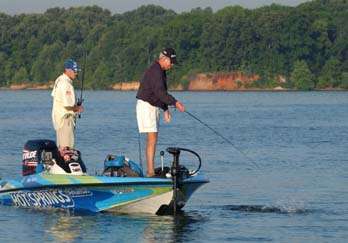
If there's one thing that really separates the merely good anglers from the great ones, it's the ability to successfully fish deep water. Most of us just aren't very effective beyond the range of a deep diving crankbait. And if we need to reach down really deep for our bass — beyond 25 feet or so — success is like finding that needle in the haystack.
One of the nation's best deep water anglers is Elite Series pro Mike Wurm. The Hot Springs, Ark., angler is adept at catching bass throughout the year, but he really shines when fishing deep. His advice — for both beginners and aspiring pros — will work for you.
For beginners, Wurm emphasizes that successful deep water fishing is a lot more than just turning around in your boat and making a cast toward the middle of the lake. Preparation is vitally important.
"You need to do your homework to catch deep water bass," Wurm says. "Look at a good lake map or spend some time driving around the lake with an eye on your depthfinder and seeing what deep water options you have.
"Look for areas with steep dropoffs — where the contour lines are close together on a topographic map — and concentrate there. In the summertime, that means offshore humps and creek channel ledges."
Wurm offers another tip for aspiring deep water experts: Concentrate on points.
Just find a main lake point and start fishing gradually deeper," he says. "You can begin with a medium running crankbait; then work out a little deeper and go to a deep diving crankbait; then get out a little deeper and tie on a magnum crankbait. Eventually you'll need to be fishing a Carolina rig or a jig, but just keep going deeper until you find the bass or the point drops off into a channel. It's something that you can do on virtually any body of water."
For those who already consider themselves pretty skilled at deep water bassing, Wurm has some ideas for taking your fishing to the next level.
"Take the structure and cover you're fishing and really start to break it down," the affable Arkansan says. "Don't just fish the ledge or hump; fish a particular rock or stump on that piece of structure. Identify the specific piece of cover on the structure that's holding the fish and get good enough that you can bounce your lure off it on every cast."
Modern GPS systems are helpful for this kind of precision, but even they aren't good enough, says Wurm. To really zero-in on the cover requires triangulation — the lining up of several permanent landmarks in two directions about 90 degrees apart. Once you have a spot properly triangulated, you can return to it again and again without fail … and without electronics.
"The best I ever saw at that was [1993 Bassmaster Classic champion and 1994 Bassmaster Angler of the Year] David Fritts. He could stop on a ledge orhump, get lined up and hit a specific piece of cover on his first cast. He'd fish that one tiny area that he knew held the fish and then be on to his next spot.
Wurm's final piece of advice is simply to give deep water fishing a fair try
Everyone beats the bank," he offers, "but the fish that live offshore seldom see a lure. Once you've learned to effectively fish deep water, you've taken a big step toward separating yourself from the rest of the anglers out there."




